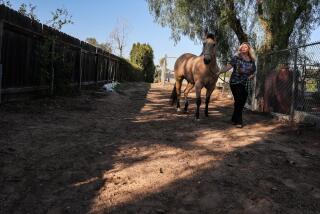Volunteers Must Be Trained Before They Rescue Birds, Officials Say
- Share via
HUNTINGTON BEACH — A training program, conducted by the state, is now mandatory before volunteers can work in teams trying to rescue birds stricken by the oil spill, officials said Saturday.
Huntington Beach Mayor Thomas J. Mays, flanked by federal and state officials at a press conference on the beach, outlined the plans for training 500 rescue volunteers.
Mays said the city is grateful for “an overwhelming response by volunteers” who want to help clean the beaches or rescue birds.
But Mays said safety necessitates that no volunteers be used for beach cleaning without training and protective outfits provided by the city.
“We have come up with a detailed plan to protect our wildlife during this emergency situation,” Mays said. “Only trained and appropriately dressed volunteers will be allowed on the beach, since the oil is a toxic substance and can be harmful.”
He said training sessions will be held daily at noon, 3 and 6 p.m. at the city’s lifeguard headquarters at 1st Street and Pacific Coast Highway.
Mays said the city will provide each person who completes the training with the appropriate protective gear, including boots and gloves, at no cost. Anyone wishing to take the training should register at lifeguard headquarters.
Mays added, however, that the city already has 2,000 volunteers.
Bruce Kinney, an official with the state Department of Fish and Game, said too many untrained volunteers have been stampeding the beaches in recent days. Kinney said the sight of so many people has discouraged some oil-stricken birds from coming ashore, “and some of them just stay in the water and drown.”
He said trained volunteers will be taught how to search the shoreline periodically so as not to frighten the birds.
Victor Leipzig, executive director of the Bolsa Chica Conservancy, said some oil-injured birds may fly inland before landing. He asked area residents who find such birds not to pick them up but to call (714) 536-1455 and ask for aid.
More to Read
Sign up for Essential California
The most important California stories and recommendations in your inbox every morning.
You may occasionally receive promotional content from the Los Angeles Times.













